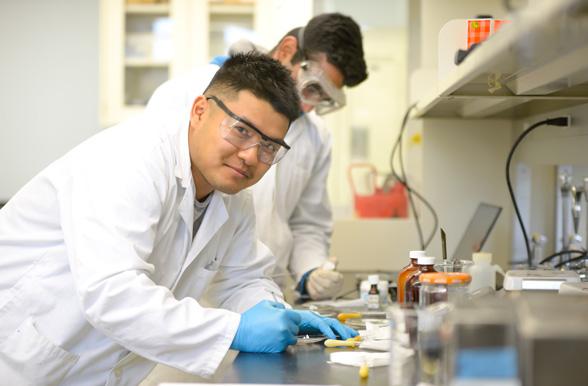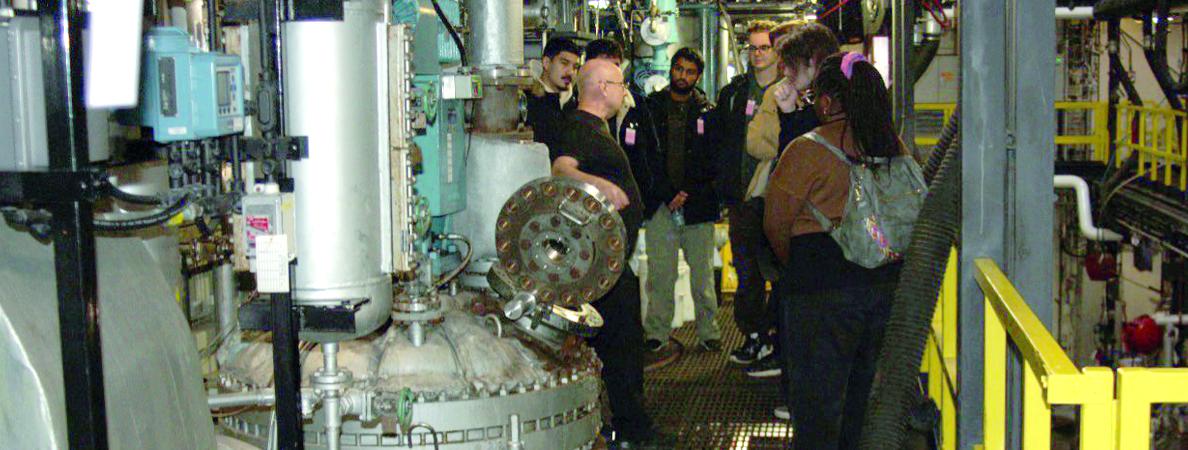Chemical Engineering Technology - 533
Overview
Thank you for your interest in Mohawk College!
This program is not currently accepting applications. You may want to check out similar programs, including:
Need help finding a program or not sure which program or career is right for you? Our career tools can help you narrow the search in just a few easy steps.
Or, connect with a Recruitment and Outreach Advisor who can help you narrow down your options, identify programs that fit your interests and goals, and discuss career opportunities.
You can also return to the list of all programs to search again. International Students can visit the International Student site for more information.
Program Highlights
- High graduate and co-op placement rates.
- State-of-the-art lab equipment and facilities.
- Excellent reputation among major chemical industries and government agencies.
What you'll learn
- Industry-standard lab practices and sampling techniques.
- Instrumental analysis methods.
- Quality assessment and control protocols.
- Process control and automation using programmable logic controllers.
- Chemical process unit operations including distillation, evaporation, drying.
- Modeling of chemical process.
- Sustainability concepts in chemical engineering.
- Principles of biotechnology and environmental engineering.
Mohawk’s Chemical Engineering Technology program prepares students for the workplace. Graduates have the theoretical and practical skills required to work in laboratories, chemical manufacturing plants, agriculture, refineries, pharmaceutical plants, food and beverage industries, municipal water and wastewater facilities.
Mohawk’s Chemical Engineering Technology program is recognized for its depth of hands-on laboratory experience and wide range of co-op placement opportunities.
Program Length
3 academic years (periods of 8 months), plus co-op
Admission
Admission
Domestic and International student admission requirements
- OSSD or equivalent (Mohawk Academic Upgrading, GED) including:
- Grade 12 English, C or U or equivalent
- Grade 12 Mathematics; MAP4C ≥ 60% or MCT4C; or any U or equivalent*
- Senior Chemistry is recommended
Options are available for mature applicants.
Applicants whose first language is not English will be required to demonstrate proficiency in English.
Don't have the necessary requirements?
Language Requirements for Applicants with English as a Second Language
- See below for accepted equivalents for Grade 12 English:
- Successful completion of the GAS-English for Academic Purposes (478) program
- TOEFL minimum score of 550 (80 Internet based)
- or IELTS Academic minimum score of 6.0 overall with no band less than 5.5
- More information about acceptable certificates, can be found on the International Admission Requirements
Tuition and Fees
Tuition and Fees
2024 - 2025 Domestic Tuition and Fees
| Description | Semester 1 | Semester 2 |
|---|---|---|
| Compulsory Ancillary Fees | $881.96 | $785.16 |
| Co-op Fees | $321.32 | $314.34 |
| Compulsory Program Fees | $0.00 | $0.00 |
| Domestic Tuition | $1,354.04 | $1,354.04 |
| Total Domestic Charges Per Semester | $2,557.32 | $2,453.54 |
| Total 1st Year Fees | $5,010.86 | |
Above fees based on full-time September program start date. Contact Student Services to confirm fees for other start dates or semesters.
- Full Cost Breakdown
- Explore payment options
- Book costs for your program can be found through the Campus Store
- You will also be required to purchase safety equipment, tools/supplies and/or exam fees. Full details will be provided in your classes or at your orientation. This is an additional cost (above tuition/ancillary fees and textbooks).
2024 - 2025 International Tuition and Fees
| Description | Semester 1 | Semester 2 |
|---|---|---|
| Total Tuition & Ancillary Fee | $8,525.00 | $8,525.00 |
| Co-op Fees | $321.32 | $314.34 |
| Program Compulsory Fees | $0.00 | $0.00 |
| International Tax Recovery | $450.00 | $375.00 |
| Total International Per Semester | $9,296.32 | $9,214.34 |
| Total 1st Year Fees | $18,510.66 | |
If you pay by wire transfer, please note your bank might charge you a fee to transfer money. Make sure your transfer includes the Mohawk payment and the wire transfer fee. This applies to each wire transfer payment you make.
- Explore payment options
- Book costs for your program can be found through the Campus Store
- You will also be required to purchase safety equipment, tools/supplies and/or exam fees. Full details will be provided in your classes or at your orientation. This is an additional cost (above tuition/ancillary fees and textbooks).
Additional Information
Financial Assistance
Financial Assistance
When it comes to paying for your education, investing in your future can be more affordable than you think. A Mohawk education is one of the most cost-effective means of acquiring the skills and knowledge you need to have a prosperous and rewarding career.
As you start on your chosen career path, it's important to have a realistic set of expectations regarding the expenses associated with attending college. In addition to your tuition fees, you will also need to budget for books, supplies, housing, and other related living expenses. You may be able to supplement your income and savings with scholarships, bursaries, or loans. It pays to do some research into what types of financial assistance you may qualify for.
Available Financial Assistance Resources:
 OSAP Eligible. Learn about Ontario Student Assistance Program - OSAP (domestic students only)
OSAP Eligible. Learn about Ontario Student Assistance Program - OSAP (domestic students only)- Working on Campus
- Additional Sources of Funding
- Financial Assistance Home Page
Apply for Awards:
By submitting a Scholarships and Bursaries Application every semester, students have access to over $3 million in Mohawk College scholarships, bursaries and Ministry-partnered funding to help meet their financial needs.
Financial Literacy:
Whether saving for school, sticking to a budget, or planning for a major purchase, financial literacy affects us all. That's why Mohawk College is dedicated to helping students improve their financial literacy and become more confident in managing their money.
- Complete the free online Money Matters Module to earn Co-Curricular Credit!
- Financial Resources and Calculators
Program of Studies
Course Overview & Descriptions
Click on the course title for a course description.
Experiential Learning
Experiential Learning
How you’ll gain skills
- Through 600 hours of practical hands-on laboratory experience.
- By completing a capstone project in conjunction with industrial partners.
- Through 16 months of co-operative education work experience.
This co-op program has been accredited by CEWIL Canada. This represents the highest standard of achievement for co-op programs in Canada.
To learn more, please visit the Centre for Experiential Learning.
Co-op Format (Fall Intake)
| September to December | January to April | May to August |
|---|---|---|
| Semester 1 | Semester 2 | Vacation |
| Semester 3 | Semester 4 | Work Term 1 (Co-op) |
| Semester 5 | Work Term 2 (Co-op) | Work Term 3 (Co-op) |
| Work Term 4 (Co-op) | Semester 6 |
Co-op Format (Winter Intake)
| September to December | January to April | May to August |
|---|---|---|
| Semester 1 | Semester 2 | |
| Semester 3 | Semester 4 | Work Term 1 (Co-op) |
| Semester 5 | Work Term 2 (Co-op) | Work Term 3 (Co-op) |
| Work Term 4 (Co-op) | Semester 6 |
Learn more about Chemical Engineering Technology
Co-op Delivery and Fees
This program has a mandatory co-op, as part of the program of study. The annual co-op fee structure can be found on the Tuition and Fees page.
For questions, please contact the Co-op Specialist listed at the bottom of the webpage.
Driver’s License and Vehicle
Please note that the majority of co-op positions for this program require that students have a valid driver’s license ('G' class preferred) and access to a vehicle.
Co-op Designation
This program offers four co-op work term opportunities but requires two completed co-op work terms for the co-op designation.
Work Term Capabilities
(which do not reflect individual work experiences & exposures)
Work Term 1
- Chemical engineering principles
- Material and energy balances
- Kinetic analysis
- Fluid flow and heat transfer analysis
- ISO concepts and ASTM
- Quality assurance concepts (Matrix spiking, internal and external standards, standard addition)
- Small scale glassware use (distillation, extraction, drying, filtration)
- Instrument use (pH, thermocouples, refractive index, melting point)
- Spectrophotometric methods of analysis (Spectroscopy - AA, UV-VIS, IR)
- Analytical methods of analysis (titrimetric, gravimetric, redox, chromatography, acid-base normality, auto-titration)
- Pharmaceutical and food quality guidelines (GLPs, GMPs, ICH, USP, HAACP, Codex)
- Excel / macro programming
- Pilot plant equipment (operations)
Work Term 2, 3, and 4
- Organic synthesis and analysis
- Instrumental methods of analysis (GC/MS, HPLC, NMR)
- Data acquisition and control
- Basic electronic and electrical design
- Sensor calibration and diagnostics
- Project management concepts
- Law and ethics concepts
| Co-op Pay Range | Co-op Pay Average |
|---|---|
| Range: $18.00 - $29.00 | Average: $22.00 |
For further information, please contact:
Blair Goodman, Co-op Specialist
Phone: 905-575-2168
Email: blair.goodman [at] mohawkcollege.ca (Blair Goodman)
Learning Outcomes
Learning Outcomes
Program Learning Outcomes, often referred to as ‘Program Standards', set out the essential learning that a student must achieve before being deemed ready to graduate.
In many cases these program learning outcomes were developed by the Ministry of Colleges and Universities (MCU) in consultation with employers and educators who are experts in the program field. To ensure the outcomes remain current and in line with industry needs, we invite our employers, graduates working in the field and current students to re-examine and update them during regular, ongoing program review focus groups.
Career Opportunities
Career Opportunities
Your future career options
- Chemical Engineering Technologist
Where you could work - Sectors:
- Biotechnology and pharmaceuticals
- Energy
- Food and beverages
- Education
- Environmental Protection
- Chemical production
- Materials
- Water industry
Type of work:
- Chemical laboratories
- Industrial chemical plants
- Water/Wastewater treatment facilities
- Research and development laboratories or pilot plants
- Technical sales
Opportunities for grads
- Graduates may be eligible to be registered as associate members of The Ontario Association of Certified Engineering Technicians and Technologists (OACETT).
Affiliations
Ontario Association of Certified Engineering Technicians and Technologists (OACETT) upon submission of the Graduate Application form available through OACETT.
Educational Pathways
Educational Pathways
Pathways to Mohawk
If you've successfully taken a course at another post-secondary institution, you may be able to earn course exemptions toward your credential here at Mohawk.
If you have successfully completed one of the following programs at Mohawk, you may be eligible to receive transfer credit in this program. To start a new program at Mohawk, you must apply via ontariocolleges.ca.
Transfer from
You can transfer to the Chemical Engineering Technology - 533 from the following programs:
Pre-Technology
General Arts and Science Certificate (College Transfer)
Pre-Health Sciences Pathway to Advanced Diplomas and Degrees
Pre-Health Sciences Pathway to Certificates and Diplomas
Environmental Technician
Biotechnology
Biotechnology - Advanced
Receiving Program
Chemical Engineering Technology
Transfer to
You can transfer from the Chemical Engineering Technology - 533 to the following programs:
Digital Health
Digital Health Bachelors Degree (Honours)
Credit transfer agreements have been arranged to make it easier for students to move from Mohawk to another institution.
Transfer From Chemical Engineering Technology To
Athabasca University
1 University Dr
Athabasca AB T9S 3A3
Canada
Bachelor of Commerce (PD)
Bachelor of Commerce (PD) with Majors:
- Accounting, Business Technology Management
- Business Technology Management
- Finance, Human Resources
- Indigenous Business
- Marketing
Bachelor of Science - PD
Bachelor of Science - PD with Majors:
- Applied Mathematics
- Computing Information Systems
- Human Science
Bachelor of Management (PD) 3 yr
Bachelor of Human Resources and Labour Relations
1 University Dr
Athabasca AB T9S 3A3
Canada
McMaster University
1280 Main Street West
Hamilton ON L8S 4L8
Canada
Bachelor of Technology - Manufacturing Engineering Technology
1280 Main Street West
Hamilton ON L8S 4L8
Canada
Queen's University
45 Union St #300
Kingston ON K7L 3N6
Canada
45 Union St #300
Kingston ON K7L 3N6
Canada
Mohawk College makes every effort to ensure the accuracy of each transfer opportunity. Please note that changes may occur in program offerings, admission requirements, and transfer credits granted by the receiving institutions. We advise all students to check with the receiving institution directly for the most up-to-date information.
Don’t see what you’re looking for? Search ONTransfer.ca for more pathways with Ontario public colleges and universities.
Mohawk College makes no warranty or endorsement of material contained within links to external websites, nor does the College assume any responsibility for the linked website or its contents.
Tech Requirements
Tech requirements
Students will need to have access to a computer with high speed internet connection and capability to run Microsoft 365 software.
Faculty
Program Coordinator

Greg Matzke
Faculty
Contact Us
Contact us
Domestic Canadian Students
Contact Student Recruitment
Haven’t applied yet and have questions?
Contact our Student Recruitment team for information on programs, how to apply, and more.
Contact Admissions
Contact our Admissions advisors for help with your application.
Email Admissions
Book an Appointment ⤻
Phone: 905-575-1212
International Students
Contact International Student Recruitment
Contact our International Student Recruitment team for information on programs, how to apply, and student life.
Contact International
Email: intl.representatives@mohawkcollege.ca
Phone: 1-905-575-2254
Toll free phone numbers:
For general questions: 1-888-Mohawk9 (1-888-664-2959)
Contact International Admissions
Contact our Admissions advisors for help with your application.
Contact International Admissions
Phone: 1-905-575-2254
*Not all programs are international eligible. Please see our programs available for international students.
Accessible Learning Services
Are you a student with a confirmed or suspected disability? Visit our Accessible Learning Services website to discover how we can help you.
Program Coordinator

Greg Matzke
Video Resources
Take a virtual tour
Chemical Engineering Technology feature starts at the 1:15
Download the video transcript (Word document)
We're here to help
We’re here to support you throughout the admissions process with online and virtual services. For general inquiries, please call 519-767-6871.
Applied and have questions?
Email Admissions or Book an appointment in person or by phone.
Haven’t applied and need help?
Email Recruitment or Book an appointment in person or by phone.
Applied as an international student?
Email International Admissions.
Take a virtual campus tour
Explore Mohawk College from the comfort of home! Our virtual campus tours provide a guided visit of our buildings, labs, services, classrooms and athletic and recreation centre.
Program delivery
Learn about program delivery terms.
Please note: in-person, virtual, and hybrid classes vary according to the program and some programs may be in-person only. Refer to the Program Overview for more information.







